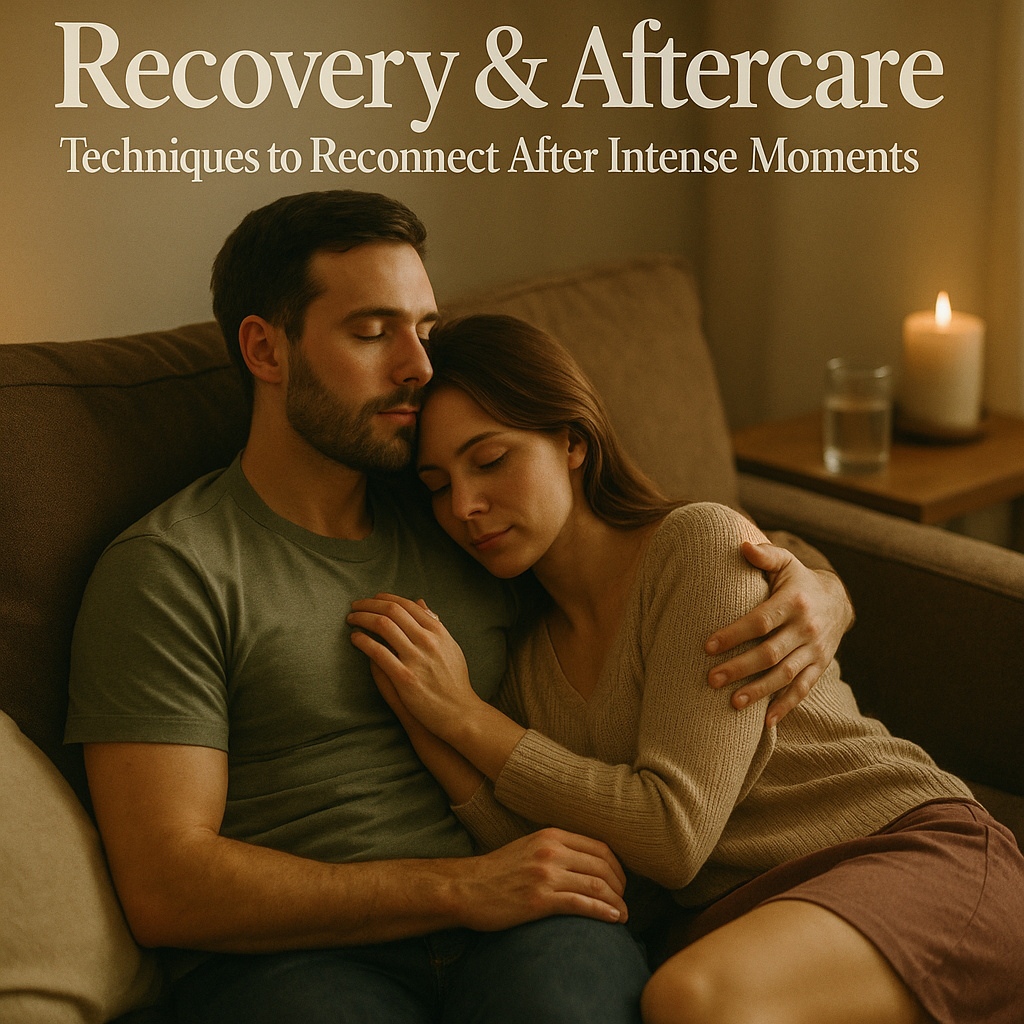Recovery & Aftercare: Techniques to Reconnect After Intense Moments
# Recovery & Aftercare: Techniques to Reconnect After Intense Moments
## TL;DR
In moments of intensity—be it in physical activities, emotional experiences, or intimate encounters—post-event recovery is crucial for mental and physical well-being. This article explores various techniques for reconnecting after these experiences, emphasizing self-care, communication, and emotional support. Whether it’s a high-energy workout, an intense emotional discussion, or a passionate encounter, the right aftercare can enhance your overall experience and strengthen your connections with others.
## Editor’s Note
Hey there, readers! Life can get intense, can’t it? Whether you’ve just wrapped up a rigorous workout, navigated a heartfelt conversation, or shared a passionate moment with someone special, it’s essential to know how to reconnect with yourself and others afterward. Recovery and aftercare are not just buzzwords; they’re vital components of maintaining healthy relationships and personal well-being. So grab a comfy seat, and let’s dive into practical techniques that can help you navigate those intense moments and come out feeling renewed and connected!
—
## Understanding the Importance of Recovery & Aftercare
Experiencing intense moments, whether they are physical, emotional, or relational, can leave you feeling exhilarated yet drained. Recovery and aftercare serve as essential tools to help you recalibrate and reconnect with yourself and others. Here’s why they are so important:
### H2: Emotional and Physical Recovery
1. **Emotional Reconnection**: Intense experiences can stir up a whirlwind of emotions. Taking time for aftercare helps you process these feelings and fosters deeper connections with those involved.
2. **Physical Recovery**: For those engaged in strenuous physical activities, proper recovery is critical for muscle repair and overall health. Techniques such as stretching and hydration can aid recovery.
3. **Reinforcement of Relationships**: The right aftercare practices can strengthen bonds with partners, friends, or family members, creating a safe space for open communication and emotional connection.
### H2: Common Scenarios That Require Aftercare
1. **Intense Workouts**: High-energy physical activities can leave you exhausted, both physically and mentally.
2. **Emotional Discussions**: Conversations that touch on deep feelings or past traumas can be draining and require careful handling afterward.
3. **Intimate Experiences**: Sharing a passionate moment with a partner can lead to both physical and emotional intensity, necessitating reconnection afterward.
—
## Step-by-Step Practical Techniques for Recovery & Aftercare
### H3: Technique 1: Cool Down and Stretch
**Purpose**: To promote physical recovery and reduce muscle tension.
**Steps**:
1. **Allow your heart rate to gradually decrease**: After an intense workout, take a few minutes to walk around lightly or practice deep breathing to lower your heart rate.
2. **Stretch major muscle groups**: Focus on areas that were heavily used during the intense moment. Hold each stretch for at least 15-30 seconds for effectiveness.
3. **Hydrate**: Drink water or electrolyte beverages to replenish lost fluids.
### H3: Technique 2: Engage in Reflective Journaling
**Purpose**: To process emotions and gain clarity.
**Steps**:
1. **Set aside time**: Find a quiet space where you can write without distractions.
2. **Write freely**: Reflect on your feelings about the experience. What stood out to you? How did you feel during and after the moment?
3. **Identify lessons learned**: Consider what you can take away from the experience for future situations.
### H3: Technique 3: Open Communication with Others
**Purpose**: To enhance emotional understanding and connection.
**Steps**:
1. **Start a conversation**: Reach out to your partner or friends involved in the intense moment.
2. **Share feelings**: Express how you felt and encourage them to share their perspective.
3. **Listen actively**: Offer a safe space for them to express their thoughts without interrupting.
### H3: Technique 4: Mindfulness and Meditation
**Purpose**: To center yourself and promote relaxation.
**Steps**:
1. **Find a quiet space**: Settle down in a calm environment where you won’t be disturbed.
2. **Practice deep breathing**: Inhale deeply through your nose, hold for a few seconds, and exhale slowly through your mouth.
3. **Focus on the present moment**: Allow thoughts to come and go without judgment, bringing your attention back to your breath.
### H3: Technique 5: Engage in a Relaxing Activity
**Purpose**: To unwind and recharge.
**Steps**:
1. **Choose an enjoyable activity**: This could be reading, watching a movie, or taking a warm bath.
2. **Limit screen time**: Engage in activities that do not require screens to promote relaxation.
3. **Incorporate soothing elements**: Use candles, soft music, or essential oils to create a peaceful atmosphere.
### H3: Technique 6: Physical Touch and Affection
**Purpose**: To reinforce intimacy and connection.
**Steps**:
1. **Initiate physical touch**: Cuddling, hugging, or gentle massages can promote feelings of safety and warmth.
2. **Express appreciation**: Verbally acknowledge your partner or friends for sharing the experience with you.
3. **Establish post-intimacy routines**: Create rituals that help you reconnect physically and emotionally after intense moments.
—
## Frequently Asked Questions (FAQ)
### Q1: What is aftercare, and why is it important?
Aftercare refers to the practices and techniques used to reconnect emotionally and physically after an intense experience. It’s important because it promotes emotional processing, physical recovery, and strengthens relationships.
### Q2: How long should aftercare last?
The duration of aftercare can vary depending on the intensity of the experience. It may require a few minutes to a couple of hours, so listen to your body and emotions.
### Q3: Can aftercare be practiced alone?
Yes! Many aftercare techniques, such as journaling and mindfulness, can be done individually. However, involving others can enhance emotional processing.
### Q4: What activities are best for aftercare?
Activities such as gentle stretching, relaxing baths, engaging in hobbies, and open communication are effective for aftercare.
### Q5: Is aftercare only relevant for physical experiences?
No, aftercare is relevant for emotional and relational experiences as well. It helps in processing feelings and reinforcing bonds with others.
### Q6: How can I initiate aftercare with my partner?
Start by expressing your desire to reconnect after an intense experience. Share what aftercare means to you and ask about their preferences.
### Q7: Are there specific aftercare techniques for emotional discussions?
Yes, reflective journaling, open communication, and mindfulness are great techniques after emotionally charged discussions.
### Q8: What if I’m not sure how to communicate my feelings?
Try journaling first to clarify your thoughts before discussing them with someone else. This can help reduce anxiety about communication.
### Q9: Can aftercare improve my overall well-being?
Absolutely! Consistent aftercare practices can enhance emotional resilience, reduce stress, and strengthen relationships.
### Q10: Where can I find more resources on aftercare and recovery?
Many public resources are available online, including mental health websites, yoga and fitness blogs, and relationship advice platforms.
—
## Sources
1. [Psychology Today – The Importance of Aftercare](https://www.psychologytoday.com/us/blog/the-moment-youth/202003/the-importance-aftercare)
2. [Healthline – The Benefits of Stretching](https://www.healthline.com/health/benefits-of-stretching)
3. [Mindful – Mindfulness Techniques](https://www.mindful.org/meditation/mindfulness-getting-started/)
4. [Verywell Fit – Importance of Hydration](https://www.verywellfit.com/the-importance-of-hydration-4110984)
5. [The Art of Manliness – Communicating Effectively](https://www.artofmanliness.com/articles/a-guide-to-effective-communication/)
Feel free to explore other articles on [jelqing](https://dickcangrow.com/op-i-tried-jelqing-for-a-month-what-actually-happened-and-my-top-picks/) and [anatomy](https://dickcangrow.com/anatomy-of-the-penis) for further insights into physical and emotional health.
—
In conclusion, recovering and reconnecting after intense moments is an essential process for maintaining our emotional balance and strengthening our relationships. By employing various aftercare techniques, we can ensure that we emerge from these experiences feeling rejuvenated and more connected to ourselves and those around us. Remember, the journey of recovery is unique for everyone, so find what resonates with you, and enjoy the process!
Share this content:


Post Comment